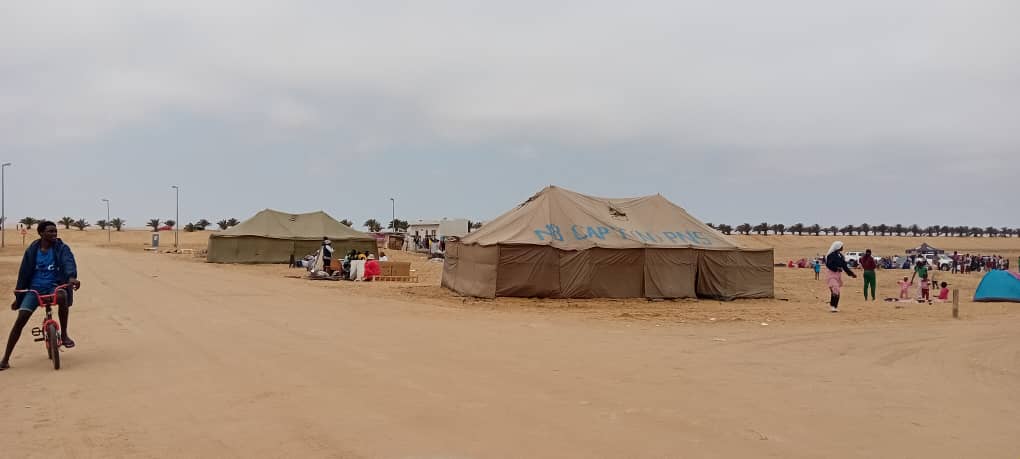IT is only a matter of time before some 3 000 squatters will be evicted from the so-called ‘Mix Camp’, an informal settlement on a privately-owned plot at Brakwater, north of Windhoek.
“They have to go, it’s not their place. The writing is on the wall.I can’t compromise.I can’t buy property for other people,” Secretary to Cabinet, Frans Kapofi, told The Namibian.Kapofi has turned to the High Court to force residents to pay him rent for living on his property, which he says they are occupying illegally.Kapofi acquired the 50 hectare plot, Portion 8 of Farm Emmarentia, last July, through the close corporation Eluwa Lya Tenda Property of which he is the sole member.At the time he gave the squatters notice that they would have to pay rent for living there and informed them that they should find alternative accommodation.But they have refused to budge.Eluwa Lya Tenda Property is now suing Monica Pascheka, a resident of Brakwater, for collecting money from the residents but refusing to pass it on to Kapofi.Legal outfit Chris Brandt Attorneys is also being sued – for administering the trust into which the collected money is being paid.Pascheka, however, contends that the suit against her is misdirected in that she acts as “an agent” for the Mix Community, concerned about their well-being.She contends that Kapofi should sue the residents themselves.Pascheka admits to collecting money for water consumption from residents which is then deposited in a bank account of Kapofi’s.He does not dispute receiving this money, but claims the full amount is not always paid.Last year, Kapofi set a levy of N$45 a month per shack as rent money, as well as levies for keeping small stock.”The property is mine not theirs.They pay for water but I pay the rates and taxes.It’s not a question of wanting them to go.I didn’t buy the land for them,” he said at the end of last week.Pascheka says the rent money is being saved by the community in the hope of buying a portion of the farm to live on permanently.In an affidavit, Kapofi contends that he never agreed to such an arrangement and wants the money paid to him.Pascheka told The Namibian that not all residents were paying rent as most feared eviction from the property.Kapofi has said that he would consider selling the plot to the squatters at market value, but was not prepared to only sell a part of the land.”She [Pascheka] has chosen… to be the representative of the people, she must answer.If she loves the people so much why doesn’t she take them to her property,” Kapofi said.He added that he was handling one case at a time, and once the case was heard in October, he would pursue action to have the Mix residents leave his property.Residents of Mix Camp, some of whom have lived there for as long as 20 years, are mostly employees of parastatals, businesses and farms in the Brakwater area.The informal settlement started in the 1980s when the former plot owner, the late Heiner Mix, allowed some workers to settle on his property.Since his death in 1999, the settlement has mushroomed in the absence of a landlord.The writing is on the wall.I can’t compromise.I can’t buy property for other people,” Secretary to Cabinet, Frans Kapofi, told The Namibian.Kapofi has turned to the High Court to force residents to pay him rent for living on his property, which he says they are occupying illegally.Kapofi acquired the 50 hectare plot, Portion 8 of Farm Emmarentia, last July, through the close corporation Eluwa Lya Tenda Property of which he is the sole member.At the time he gave the squatters notice that they would have to pay rent for living there and informed them that they should find alternative accommodation.But they have refused to budge.Eluwa Lya Tenda Property is now suing Monica Pascheka, a resident of Brakwater, for collecting money from the residents but refusing to pass it on to Kapofi.Legal outfit Chris Brandt Attorneys is also being sued – for administering the trust into which the collected money is being paid.Pascheka, however, contends that the suit against her is misdirected in that she acts as “an agent” for the Mix Community, concerned about their well-being.She contends that Kapofi should sue the residents themselves.Pascheka admits to collecting money for water consumption from residents which is then deposited in a bank account of Kapofi’s.He does not dispute receiving this money, but claims the full amount is not always paid.Last year, Kapofi set a levy of N$45 a month per shack as rent money, as well as levies for keeping small stock.”The property is mine not theirs.They pay for water but I pay the rates and taxes.It’s not a question of wanting them to go.I didn’t buy the land for them,” he said at the end of last week.Pascheka says the rent money is being saved by the community in the hope of buying a portion of the farm to live on permanently.In an affidavit, Kapofi contends that he never agreed to such an arrangement and wants the money paid to him.Pascheka told The Namibian that not all residents were paying rent as most feared eviction from the property.Kapofi has said that he would consider selling the plot to the squatters at market value, but was not prepared to only sell a part of the land.”She [Pascheka] has chosen… to be the representative of the people, she must answer.If she loves the people so much why doesn’t she take them to her property,” Kapofi said.He added that he was handling one case at a time, and once the case was heard in October, he would pursue action to have the Mix residents leave his property.Residents of Mix Camp, some of whom have lived there for as long as 20 years, are mostly employees of parastatals, businesses and farms in the Brakwater area.The informal settlement started in the 1980s when the former plot owner, the late Heiner Mix, allowed some workers to settle on his property.Since his death in 1999, the settlement has mushroomed in the absence of a landlord.
Stay informed with The Namibian – your source for credible journalism. Get in-depth reporting and opinions for
only N$85 a month. Invest in journalism, invest in democracy –
Subscribe Now!










